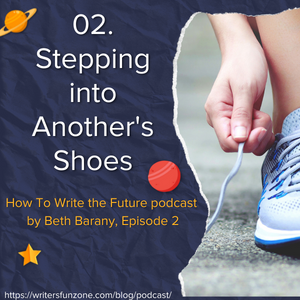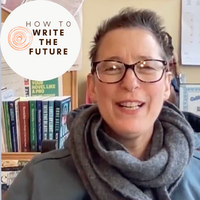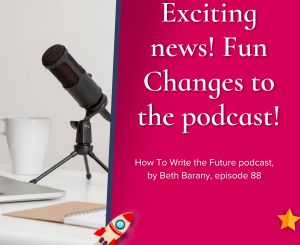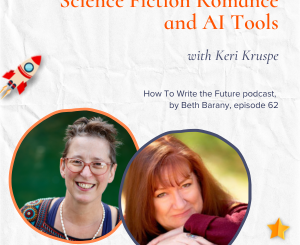02. Stepping into Another’s Shoes: Introduction to Writing Optimistic Stories About the Future

In the second episode of “How To Write The Future” titled “Stepping into Another’s Shoes,” I share my ability to slip into other people’s perspectives and about writing optimistic stories.
A skill I have used in tutoring and then eventually teaching and coaching.
Have a listen to the latest episode on Apple Podcasts | Google Podcasts | Spotify | Buzzsprout | Amazon Music | Podcast Addict | Podchaser| Youtube
ABOUT BETH BARANY
Beth Barany is an award-winning novelist, master neurolinguistic programming practitioner, and certified creativity coach for writers, including being a workshop leader & keynote speaker. Beth has published books in several genres including young adult fantasy, paranormal romance and science fiction.
Learn more about Beth Barany at these sites:
Author site / Coaching site / School of Fiction / Writer’s Fun Zone blog
SHOW NOTES
I have always been able to see things from other people’s perspectives, which helps me be a very good writer and teacher, but when I start taking on their beliefs and habits, it can become a problem. So, I had to learn some tools to help me and that can help you too.
In this episode, you will learn:
- How does Beth Barany’s ability to slip into other people’s perspectives help her be a good writer and teacher?
- What is systems thinking and how can it be applied to storytelling?
- What are some of the different mental models of looking at the world?
“I am constantly growing in this space and that is so exciting.”
As a kid, I would automatically slip into a character’s perspective from a story or a movie. I didn’t know it at the time, but I was stepping into their shoes. I was taking on their perspective. I was even taking on some of their beliefs and habits of speech and mannerisms. This ability of mine to slip into other people’s shoes has actually helped me be a very good writer and teacher… and can help you too.
Summary
1) When Beth was a kid, she didn’t realize that she could see things from other people’s perspectives so easily. Now that she’s an adult, she has used that skill to become a good teacher and coach. As a fiction writer, she is interested in creating positive futures, unlike the world we live in today.
2) Beth Barany is the creator of the how to Write the Future podcast. She explains how to understand systems thinking and how it can help us create new stories. She also shares the show notes and a lecture on thinking and systems by Donnella Meadows. In upcoming episodes of the How To Write the Future podcast, she’ll talk about systems thinking and how we can apply that to the worlds that we bring into being through our novels and fiction.
3) Beth Barany is in the early stages of exploring the material from her podcast. She invites you to join the conversation about how to write the future on Twitter or LinkedIn @BethBarany or email her at beth@bethbarany.com.
TRANSCRIPT
When I was a kid, I didn’t realize, I was seeing things from other people’s perspectives so easily.
But now that I’m an adult, I see that I have used that skill quite brilliantly in tutoring and then eventually teaching and coaching. What that meant was I would feel people’s intense emotions that weren’t always mine. That still happens today. I’m totally not in conscious control of it. This does mean, on the one hand, it makes me a good teacher and a coach.
But on the other hand, it means I need to constantly clear my energy and reset at least three to five times a day, usually by walking, or puttering in my garden, or doing the dishes.
So, what does this mean as a fiction writer? Especially one focused on writing the future and especially because I am interested in creating positive futures unlike the world that we live in today.
Hi everyone. I’m Beth Barany, and I run How To Write The Future podcast.
I’m here today to talk to you about other people’s views of the world and how understanding those can help us create new stories.
So, as I said, when I was young, I didn’t quite realize that I was able to step into other people’s shoes so easily. But this has really helped me as a fiction writer and it’s helped me understand new possibilities and new visions of the world. I feel like I am constantly growing in this space and that is so exciting. And that is one of the motivations that has brought me to create this podcast on how to write the future.
There are some requirements and learning how to step into other people’s shoes. And one of them is trusting what comes up. And also knowing, like I said, how to clear out other people’s energies so that I could listen to myself and discover what it was that I was designing for my story worlds.
But I also found that it was confusing at first. It was confusing because I didn’t realize I was so often stepping into other people’s experiences and their emotions and their thoughts and their feelings. But in the course of my research and working on my own science fiction series, I stumbled upon systems thinking.
And I became a huge fan because all of a sudden, it coalesced some things that I had been studying for years, but never quite putting my finger on it.
Systems thinking is an awareness that we’re all inside of systems, multiple systems. Our family is a great example of a system. So is our schools, our places of worship, our extended families. And of course our town or city, the state or region, but also other things like the water system that is set up in our town or city, and even the water cycle of the planet.
And then focusing on our bodies. Our bodies are a collection of interlocking and highly dependent systems and very complex systems. We even name the systems in our body.
Like the circulatory system or the endocrine system.
Another factor about systems is they’re complicated. They’re complex. They’re are sometimes very hard to predict.
But they all have one thing in common.
A goal.
For example, the goal of the body system is to keep us alive. The goal of the family system is to support growth, ideally, and help bring about the next generation so they can procreate and bring in the next generation. And so on.
The goal of democracy is ruled by and for the people. That’s a designed system. The goal of capitalism as we have designed it to date is to make money for the shareholders.
Systems are either designed by humans. Or created by nature.
We’re shaping the natural environment as well. We’re affecting the systems in the natural environment. The natural environment has affected us, has created us.
So when it comes back to storytelling and how to create the future, it really, really helps to understand what are the systems operating inside of your story.
You can look at it as the political systems, the cultural systems, the social systems, the interpersonal systems.
And then look at your own life. Notice what kind of systems are you living inside of now?
When I’m working on designing future worlds in my science fiction series and even worlds in my fantasy series, I use the environment as I observe it in our own world as my baseline, as, as a jumping off ground.
So I encourage you to look at your own life in your own environment, and notice the kinds of systems that you are living inside of.
Where is the room for change in your own life? Where do you wish was room for change in your own life?
What are the systems that impact you?
What are the systems that you get to influence?
Now think of your story, what kind of systems do you want to create in the story?
When I’m working on stories, especially at the earliest stages of the planning, I look to what I truly desire, and then I look to the story and how could I put those ideas into the environment that my investigator goes to.
There are a lot of amazing resources on understanding systems thinking. In fact. I was inspired to start to understand systems in a broader perspective especially starting with Donella Meadows book, Thinking In Systems. That information is in the show notes.
Additionally, she has a wonderful lecture on YouTube that I’ll also share the show notes that’s pretty contemporary to, to us today. And then if you want to get a look into how Donella was as a younger professor you can watch also on YouTube some of her earlier lectures.
If we are going to create new ways of being in the world, we need to create new systems, new political systems, new environmental systems, the ways we interact with our environment, new systems of, of money currency, new educational systems.
But if we don’t actually understand how systems operate, we could feel at the mercy of them.
So in upcoming episodes, I will be diving deeper into systems thinking and how we can apply that to the worlds that we bring into being through our novels, through our fiction.
I do want presence another place where I was educated on systems. And that’s in family constellations work.
This is looking at the family as a system, and then there’s other more systemic constellations, which is about recognizing how a company or a school or an organization is a system and these methodologies are, how can I say, they aren’t operating in the mundane world. They’re definitely operating in other levels. And so I will come back to these kinds of systems and discuss this framework as well.
The point of my podcast, How To Write The Future, is also to help you start to recognize that there are many, many mental models of looking at the world.
When I was a child, I would automatically and effortlessly slip into a character’s perspective from a story or a movie, slip into other people’s perspectives who, who weren’t from the town I was living in. Maybe a family member from halfway across the country, or somebody from another country was visiting us. And then all of a sudden I felt like I was them and I was seeing the world through their eyes. I didn’t know it at the time, but I was stepping into their shoes. I was taking on their perspective.
I was even taking on some of their beliefs and I’d even take on some of their habits of speech and mannerisms.
This was a little jarring to the adults around me who looked at me like I was a bit odd.
Well, That’s the life of a creative.
I’ve since learned that this ability of mine to slip into other people’s shoes has actually helped me be a very good writer, and teacher and coach.
So your turn.
Take some of the ideas that we learned today about systems and start to put on that lens, like a new pair of glasses. And notice all the systems in your life.
As I am in the early stages of exploring all this material in my podcast, I really thank you so much for coming along with me.
If you have any questions about how to write the future, let me know. Reply to me on Twitter or LinkedIn @ BethBarany. I invite you to join me in this conversation.
I am really curious to hear what you’re curious about. This is a co-created journey.
And I really thank you so much for listening. Write long and prosper.
WHY I STARTED THE PODCAST
I have always loved science fiction and fantasy, the worlds, as much as the adventures. But I know how it can be a struggle to build those immersive worlds. So I was excited to create the “How to Write the Future” podcast for science fiction writers who want to write positive futures.
Resources
Donella Meadows, Thinking in Systems: A Primer
https://books2read.com/thinkinginsystems
Start here for Dana (Donella) Meadows Lecture: Sustainable Systems (Part 1 of 4)
A Philosophical Look at System Dynamics by Donella Meadows (YouTube)
What is Family Constellations?
https://www.hellingerinstitute.com/what-is-family-constellations/
Connect with Beth Barany
Loved this episode? Leave us a review and rating on your podcast service.
***
CREDITS
EDITED WITH DESCRIPT
https://www.descript.com?lmref=_w1WCA (referral code)
MUSIC CREDITS
Music from Uppbeat (free for Creators!): https://uppbeat.io/t/soundroll/fuzz-buzz
License code: UMMKDRL02DFGKJ0L. “Fuzz buzz” by Soundroll.
Commercial license: https://musicvine.com/track/soundroll/fuzz-buzz
Distributed by Buzzsprout: https://www.buzzsprout.com/?referrer_id=1994465 (referral code)
SHOW PRODUCTION BY Beth Barany
SHOW NOTES SUPPORT from Kerry-Ann McDade
***
For more “How To Write the Future” episodes, go here.
If you’d like to invite Beth onto your podcast, drop her a note here.




